Case Study: Strategic Leadership, Ethics, and Apple's CSR
VerifiedAdded on 2023/06/08
|8
|2291
|75
Case Study
AI Summary
This case study provides an analysis of strategic leadership with a focus on Apple Inc. It explores the leadership qualities of Steve Jobs, the company's organizational background, and the importance of strategic leadership in Apple's success. Different leadership approaches, such as autocratic, participative, and free-rein, are examined, with an emphasis on Apple's use of the participative approach. The study critically evaluates the role of a leader in developing strategy, highlighting the importance of communication, mentorship, and continuous learning. It also assesses the influence and power of leadership, the significance of ethics, values, and corporate social responsibility, and critiques current leadership trends and concepts, including sustainability. The analysis concludes that effective leadership is crucial for organizational growth, competitive advantage, and overall success.
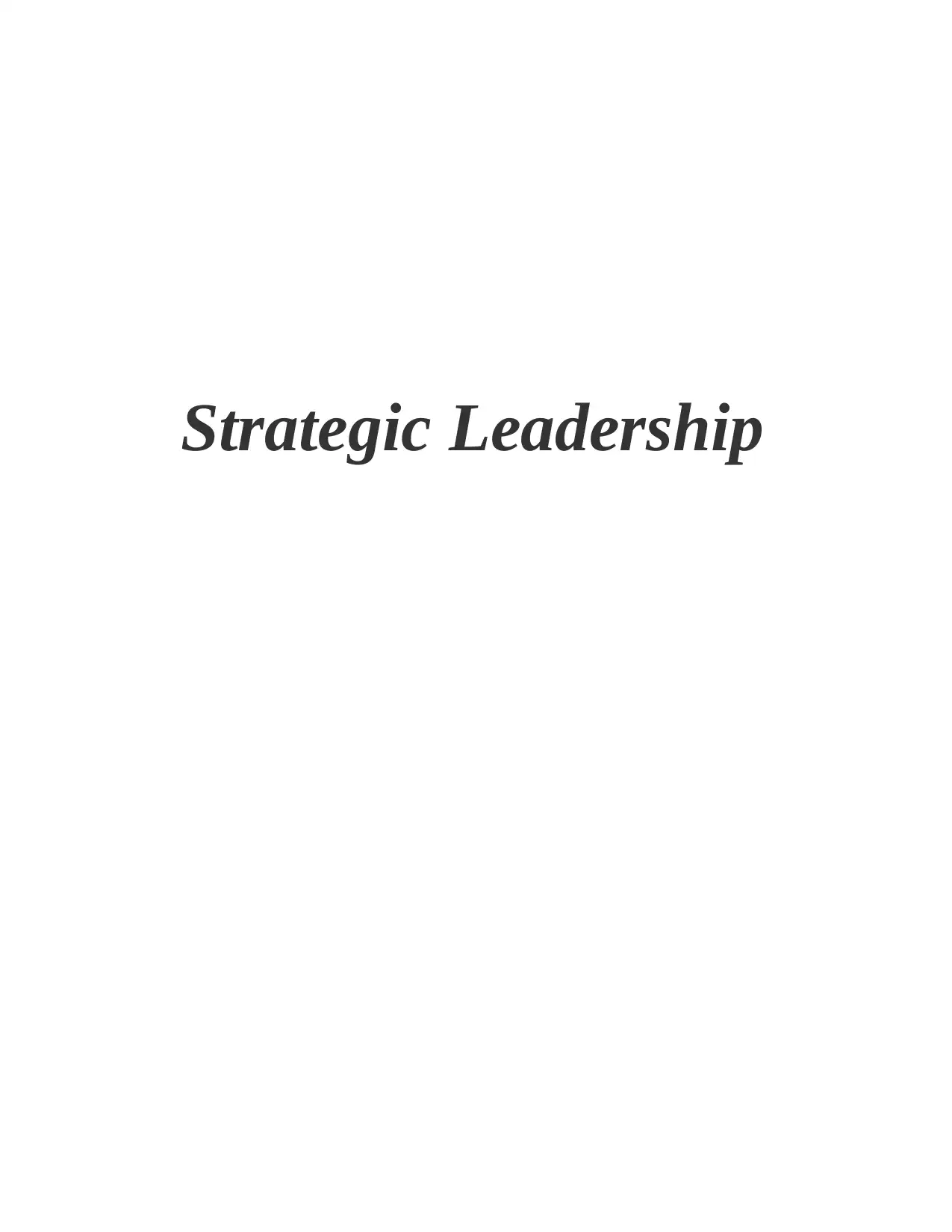
Strategic Leadership
Paraphrase This Document
Need a fresh take? Get an instant paraphrase of this document with our AI Paraphraser
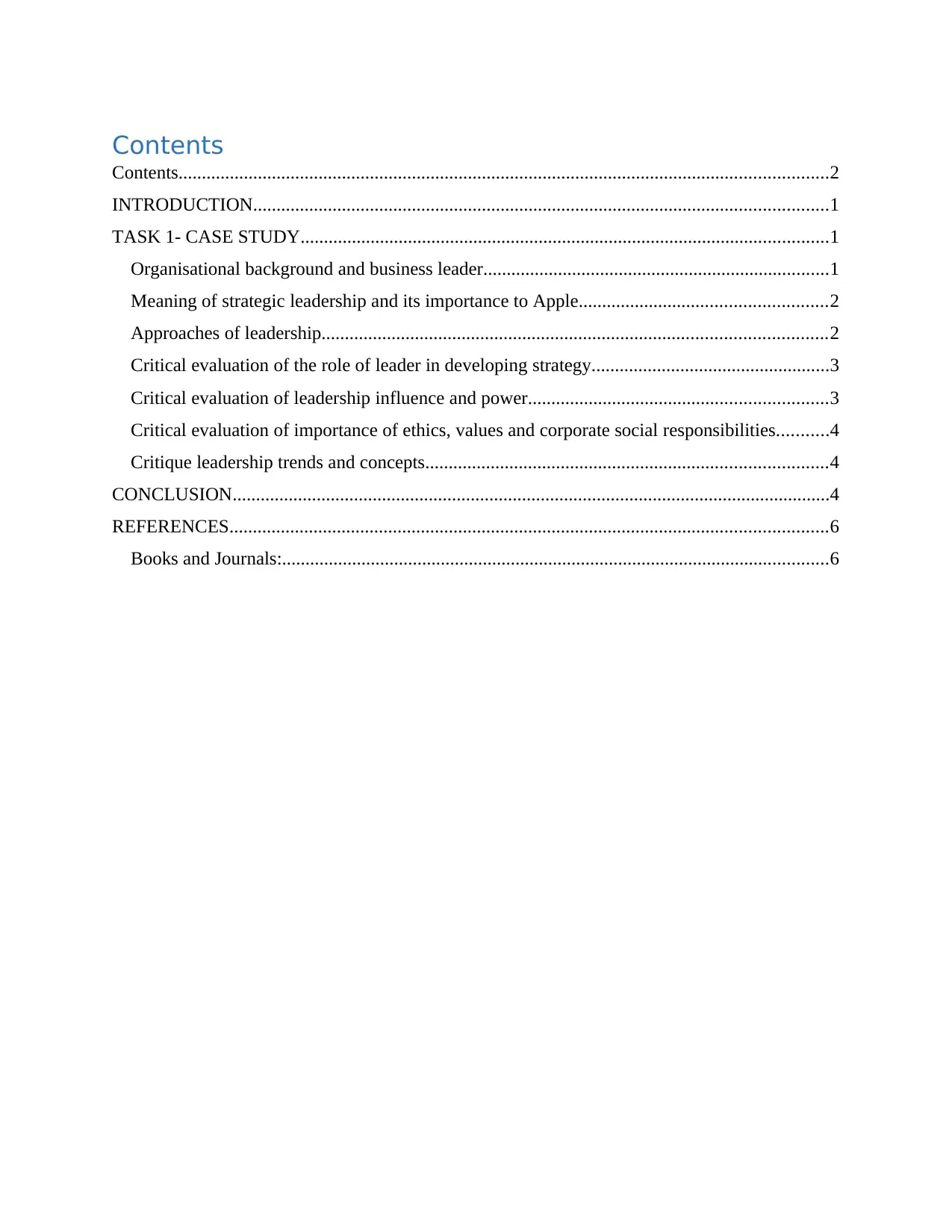
Contents
Contents...........................................................................................................................................2
INTRODUCTION...........................................................................................................................1
TASK 1- CASE STUDY.................................................................................................................1
Organisational background and business leader..........................................................................1
Meaning of strategic leadership and its importance to Apple.....................................................2
Approaches of leadership............................................................................................................2
Critical evaluation of the role of leader in developing strategy...................................................3
Critical evaluation of leadership influence and power................................................................3
Critical evaluation of importance of ethics, values and corporate social responsibilities...........4
Critique leadership trends and concepts......................................................................................4
CONCLUSION................................................................................................................................4
REFERENCES................................................................................................................................6
Books and Journals:.....................................................................................................................6
Contents...........................................................................................................................................2
INTRODUCTION...........................................................................................................................1
TASK 1- CASE STUDY.................................................................................................................1
Organisational background and business leader..........................................................................1
Meaning of strategic leadership and its importance to Apple.....................................................2
Approaches of leadership............................................................................................................2
Critical evaluation of the role of leader in developing strategy...................................................3
Critical evaluation of leadership influence and power................................................................3
Critical evaluation of importance of ethics, values and corporate social responsibilities...........4
Critique leadership trends and concepts......................................................................................4
CONCLUSION................................................................................................................................4
REFERENCES................................................................................................................................6
Books and Journals:.....................................................................................................................6
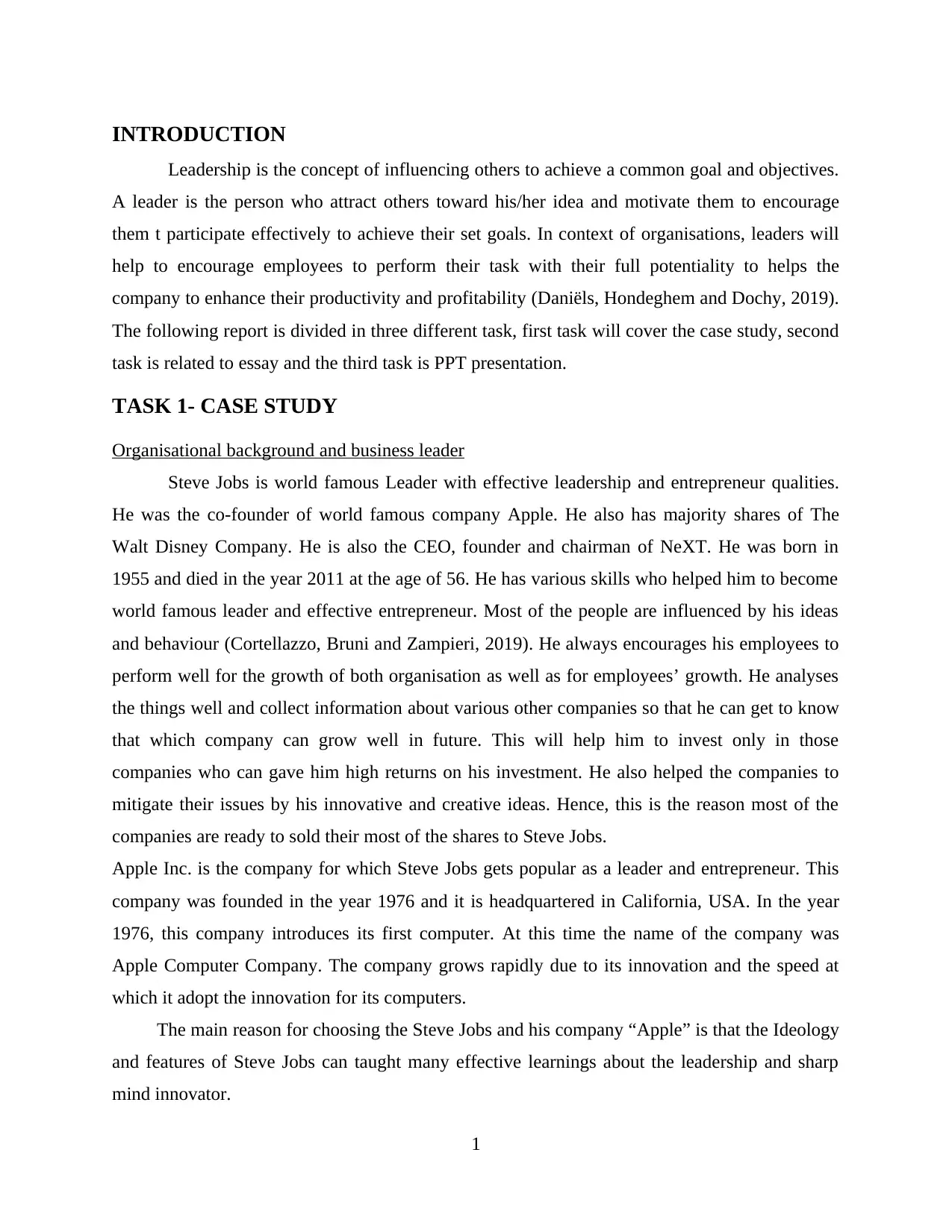
INTRODUCTION
Leadership is the concept of influencing others to achieve a common goal and objectives.
A leader is the person who attract others toward his/her idea and motivate them to encourage
them t participate effectively to achieve their set goals. In context of organisations, leaders will
help to encourage employees to perform their task with their full potentiality to helps the
company to enhance their productivity and profitability (Daniëls, Hondeghem and Dochy, 2019).
The following report is divided in three different task, first task will cover the case study, second
task is related to essay and the third task is PPT presentation.
TASK 1- CASE STUDY
Organisational background and business leader
Steve Jobs is world famous Leader with effective leadership and entrepreneur qualities.
He was the co-founder of world famous company Apple. He also has majority shares of The
Walt Disney Company. He is also the CEO, founder and chairman of NeXT. He was born in
1955 and died in the year 2011 at the age of 56. He has various skills who helped him to become
world famous leader and effective entrepreneur. Most of the people are influenced by his ideas
and behaviour (Cortellazzo, Bruni and Zampieri, 2019). He always encourages his employees to
perform well for the growth of both organisation as well as for employees’ growth. He analyses
the things well and collect information about various other companies so that he can get to know
that which company can grow well in future. This will help him to invest only in those
companies who can gave him high returns on his investment. He also helped the companies to
mitigate their issues by his innovative and creative ideas. Hence, this is the reason most of the
companies are ready to sold their most of the shares to Steve Jobs.
Apple Inc. is the company for which Steve Jobs gets popular as a leader and entrepreneur. This
company was founded in the year 1976 and it is headquartered in California, USA. In the year
1976, this company introduces its first computer. At this time the name of the company was
Apple Computer Company. The company grows rapidly due to its innovation and the speed at
which it adopt the innovation for its computers.
The main reason for choosing the Steve Jobs and his company “Apple” is that the Ideology
and features of Steve Jobs can taught many effective learnings about the leadership and sharp
mind innovator.
1
Leadership is the concept of influencing others to achieve a common goal and objectives.
A leader is the person who attract others toward his/her idea and motivate them to encourage
them t participate effectively to achieve their set goals. In context of organisations, leaders will
help to encourage employees to perform their task with their full potentiality to helps the
company to enhance their productivity and profitability (Daniëls, Hondeghem and Dochy, 2019).
The following report is divided in three different task, first task will cover the case study, second
task is related to essay and the third task is PPT presentation.
TASK 1- CASE STUDY
Organisational background and business leader
Steve Jobs is world famous Leader with effective leadership and entrepreneur qualities.
He was the co-founder of world famous company Apple. He also has majority shares of The
Walt Disney Company. He is also the CEO, founder and chairman of NeXT. He was born in
1955 and died in the year 2011 at the age of 56. He has various skills who helped him to become
world famous leader and effective entrepreneur. Most of the people are influenced by his ideas
and behaviour (Cortellazzo, Bruni and Zampieri, 2019). He always encourages his employees to
perform well for the growth of both organisation as well as for employees’ growth. He analyses
the things well and collect information about various other companies so that he can get to know
that which company can grow well in future. This will help him to invest only in those
companies who can gave him high returns on his investment. He also helped the companies to
mitigate their issues by his innovative and creative ideas. Hence, this is the reason most of the
companies are ready to sold their most of the shares to Steve Jobs.
Apple Inc. is the company for which Steve Jobs gets popular as a leader and entrepreneur. This
company was founded in the year 1976 and it is headquartered in California, USA. In the year
1976, this company introduces its first computer. At this time the name of the company was
Apple Computer Company. The company grows rapidly due to its innovation and the speed at
which it adopt the innovation for its computers.
The main reason for choosing the Steve Jobs and his company “Apple” is that the Ideology
and features of Steve Jobs can taught many effective learnings about the leadership and sharp
mind innovator.
1
⊘ This is a preview!⊘
Do you want full access?
Subscribe today to unlock all pages.

Trusted by 1+ million students worldwide
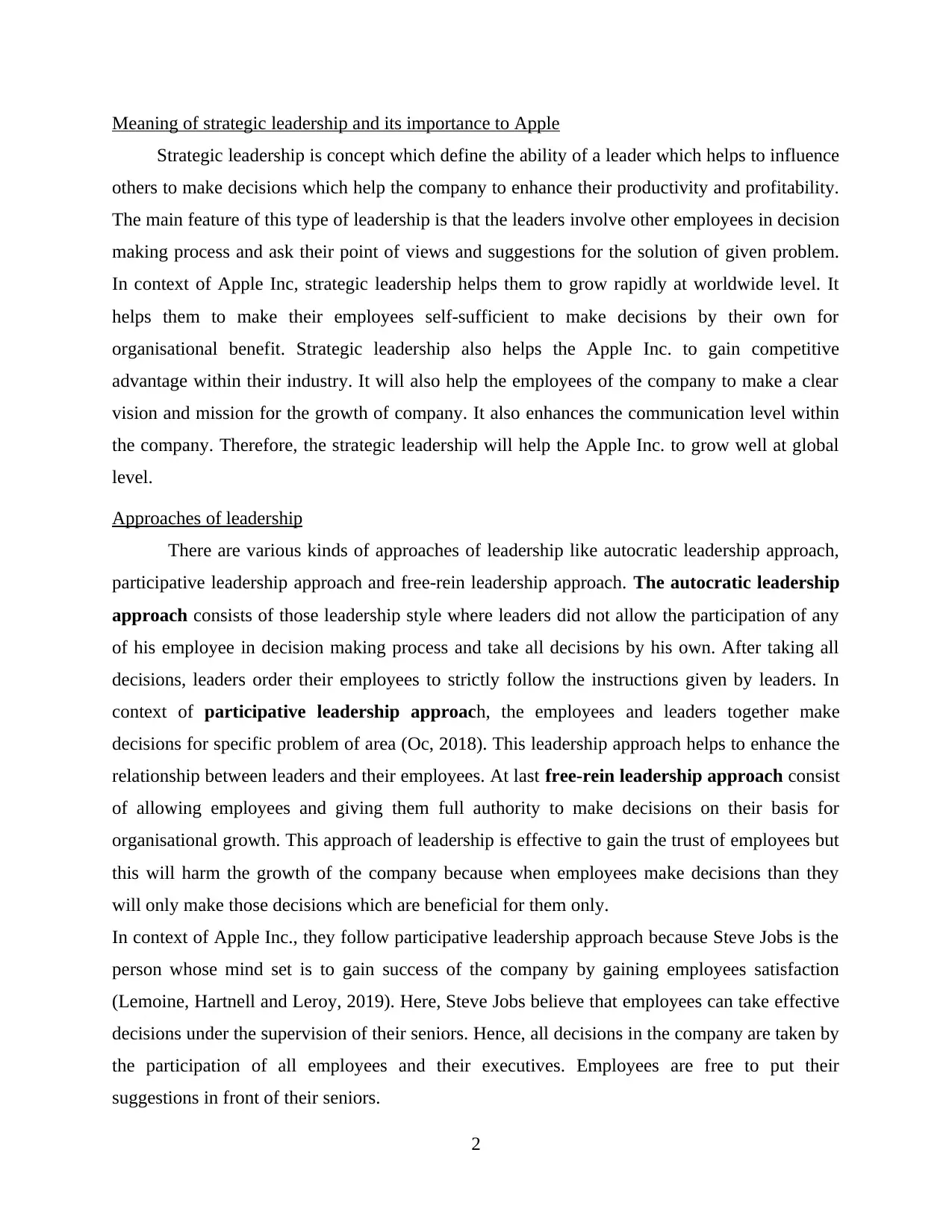
Meaning of strategic leadership and its importance to Apple
Strategic leadership is concept which define the ability of a leader which helps to influence
others to make decisions which help the company to enhance their productivity and profitability.
The main feature of this type of leadership is that the leaders involve other employees in decision
making process and ask their point of views and suggestions for the solution of given problem.
In context of Apple Inc, strategic leadership helps them to grow rapidly at worldwide level. It
helps them to make their employees self-sufficient to make decisions by their own for
organisational benefit. Strategic leadership also helps the Apple Inc. to gain competitive
advantage within their industry. It will also help the employees of the company to make a clear
vision and mission for the growth of company. It also enhances the communication level within
the company. Therefore, the strategic leadership will help the Apple Inc. to grow well at global
level.
Approaches of leadership
There are various kinds of approaches of leadership like autocratic leadership approach,
participative leadership approach and free-rein leadership approach. The autocratic leadership
approach consists of those leadership style where leaders did not allow the participation of any
of his employee in decision making process and take all decisions by his own. After taking all
decisions, leaders order their employees to strictly follow the instructions given by leaders. In
context of participative leadership approach, the employees and leaders together make
decisions for specific problem of area (Oc, 2018). This leadership approach helps to enhance the
relationship between leaders and their employees. At last free-rein leadership approach consist
of allowing employees and giving them full authority to make decisions on their basis for
organisational growth. This approach of leadership is effective to gain the trust of employees but
this will harm the growth of the company because when employees make decisions than they
will only make those decisions which are beneficial for them only.
In context of Apple Inc., they follow participative leadership approach because Steve Jobs is the
person whose mind set is to gain success of the company by gaining employees satisfaction
(Lemoine, Hartnell and Leroy, 2019). Here, Steve Jobs believe that employees can take effective
decisions under the supervision of their seniors. Hence, all decisions in the company are taken by
the participation of all employees and their executives. Employees are free to put their
suggestions in front of their seniors.
2
Strategic leadership is concept which define the ability of a leader which helps to influence
others to make decisions which help the company to enhance their productivity and profitability.
The main feature of this type of leadership is that the leaders involve other employees in decision
making process and ask their point of views and suggestions for the solution of given problem.
In context of Apple Inc, strategic leadership helps them to grow rapidly at worldwide level. It
helps them to make their employees self-sufficient to make decisions by their own for
organisational benefit. Strategic leadership also helps the Apple Inc. to gain competitive
advantage within their industry. It will also help the employees of the company to make a clear
vision and mission for the growth of company. It also enhances the communication level within
the company. Therefore, the strategic leadership will help the Apple Inc. to grow well at global
level.
Approaches of leadership
There are various kinds of approaches of leadership like autocratic leadership approach,
participative leadership approach and free-rein leadership approach. The autocratic leadership
approach consists of those leadership style where leaders did not allow the participation of any
of his employee in decision making process and take all decisions by his own. After taking all
decisions, leaders order their employees to strictly follow the instructions given by leaders. In
context of participative leadership approach, the employees and leaders together make
decisions for specific problem of area (Oc, 2018). This leadership approach helps to enhance the
relationship between leaders and their employees. At last free-rein leadership approach consist
of allowing employees and giving them full authority to make decisions on their basis for
organisational growth. This approach of leadership is effective to gain the trust of employees but
this will harm the growth of the company because when employees make decisions than they
will only make those decisions which are beneficial for them only.
In context of Apple Inc., they follow participative leadership approach because Steve Jobs is the
person whose mind set is to gain success of the company by gaining employees satisfaction
(Lemoine, Hartnell and Leroy, 2019). Here, Steve Jobs believe that employees can take effective
decisions under the supervision of their seniors. Hence, all decisions in the company are taken by
the participation of all employees and their executives. Employees are free to put their
suggestions in front of their seniors.
2
Paraphrase This Document
Need a fresh take? Get an instant paraphrase of this document with our AI Paraphraser
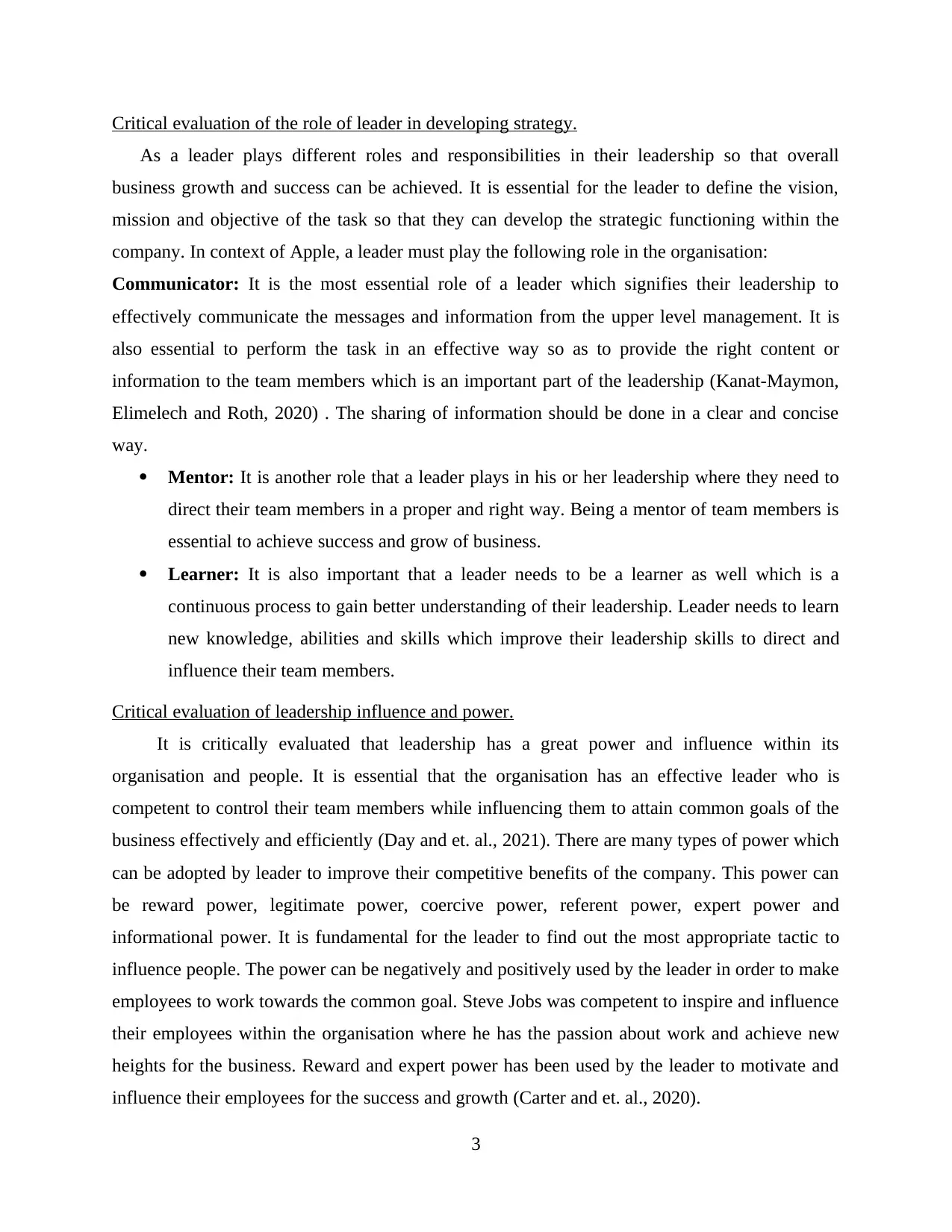
Critical evaluation of the role of leader in developing strategy.
As a leader plays different roles and responsibilities in their leadership so that overall
business growth and success can be achieved. It is essential for the leader to define the vision,
mission and objective of the task so that they can develop the strategic functioning within the
company. In context of Apple, a leader must play the following role in the organisation:
Communicator: It is the most essential role of a leader which signifies their leadership to
effectively communicate the messages and information from the upper level management. It is
also essential to perform the task in an effective way so as to provide the right content or
information to the team members which is an important part of the leadership (Kanat-Maymon,
Elimelech and Roth, 2020) . The sharing of information should be done in a clear and concise
way.
Mentor: It is another role that a leader plays in his or her leadership where they need to
direct their team members in a proper and right way. Being a mentor of team members is
essential to achieve success and grow of business.
Learner: It is also important that a leader needs to be a learner as well which is a
continuous process to gain better understanding of their leadership. Leader needs to learn
new knowledge, abilities and skills which improve their leadership skills to direct and
influence their team members.
Critical evaluation of leadership influence and power.
It is critically evaluated that leadership has a great power and influence within its
organisation and people. It is essential that the organisation has an effective leader who is
competent to control their team members while influencing them to attain common goals of the
business effectively and efficiently (Day and et. al., 2021). There are many types of power which
can be adopted by leader to improve their competitive benefits of the company. This power can
be reward power, legitimate power, coercive power, referent power, expert power and
informational power. It is fundamental for the leader to find out the most appropriate tactic to
influence people. The power can be negatively and positively used by the leader in order to make
employees to work towards the common goal. Steve Jobs was competent to inspire and influence
their employees within the organisation where he has the passion about work and achieve new
heights for the business. Reward and expert power has been used by the leader to motivate and
influence their employees for the success and growth (Carter and et. al., 2020).
3
As a leader plays different roles and responsibilities in their leadership so that overall
business growth and success can be achieved. It is essential for the leader to define the vision,
mission and objective of the task so that they can develop the strategic functioning within the
company. In context of Apple, a leader must play the following role in the organisation:
Communicator: It is the most essential role of a leader which signifies their leadership to
effectively communicate the messages and information from the upper level management. It is
also essential to perform the task in an effective way so as to provide the right content or
information to the team members which is an important part of the leadership (Kanat-Maymon,
Elimelech and Roth, 2020) . The sharing of information should be done in a clear and concise
way.
Mentor: It is another role that a leader plays in his or her leadership where they need to
direct their team members in a proper and right way. Being a mentor of team members is
essential to achieve success and grow of business.
Learner: It is also important that a leader needs to be a learner as well which is a
continuous process to gain better understanding of their leadership. Leader needs to learn
new knowledge, abilities and skills which improve their leadership skills to direct and
influence their team members.
Critical evaluation of leadership influence and power.
It is critically evaluated that leadership has a great power and influence within its
organisation and people. It is essential that the organisation has an effective leader who is
competent to control their team members while influencing them to attain common goals of the
business effectively and efficiently (Day and et. al., 2021). There are many types of power which
can be adopted by leader to improve their competitive benefits of the company. This power can
be reward power, legitimate power, coercive power, referent power, expert power and
informational power. It is fundamental for the leader to find out the most appropriate tactic to
influence people. The power can be negatively and positively used by the leader in order to make
employees to work towards the common goal. Steve Jobs was competent to inspire and influence
their employees within the organisation where he has the passion about work and achieve new
heights for the business. Reward and expert power has been used by the leader to motivate and
influence their employees for the success and growth (Carter and et. al., 2020).
3
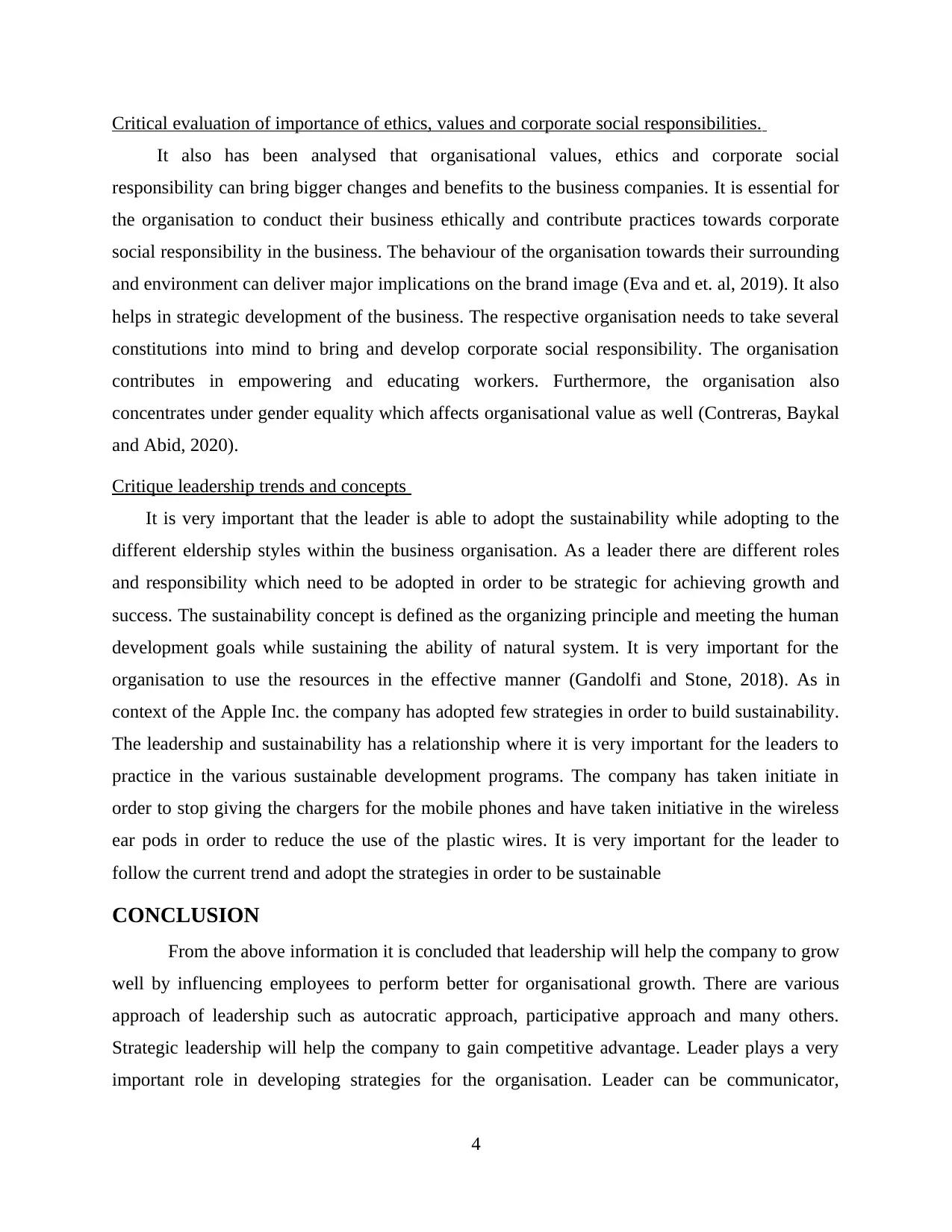
Critical evaluation of importance of ethics, values and corporate social responsibilities.
It also has been analysed that organisational values, ethics and corporate social
responsibility can bring bigger changes and benefits to the business companies. It is essential for
the organisation to conduct their business ethically and contribute practices towards corporate
social responsibility in the business. The behaviour of the organisation towards their surrounding
and environment can deliver major implications on the brand image (Eva and et. al, 2019). It also
helps in strategic development of the business. The respective organisation needs to take several
constitutions into mind to bring and develop corporate social responsibility. The organisation
contributes in empowering and educating workers. Furthermore, the organisation also
concentrates under gender equality which affects organisational value as well (Contreras, Baykal
and Abid, 2020).
Critique leadership trends and concepts
It is very important that the leader is able to adopt the sustainability while adopting to the
different eldership styles within the business organisation. As a leader there are different roles
and responsibility which need to be adopted in order to be strategic for achieving growth and
success. The sustainability concept is defined as the organizing principle and meeting the human
development goals while sustaining the ability of natural system. It is very important for the
organisation to use the resources in the effective manner (Gandolfi and Stone, 2018). As in
context of the Apple Inc. the company has adopted few strategies in order to build sustainability.
The leadership and sustainability has a relationship where it is very important for the leaders to
practice in the various sustainable development programs. The company has taken initiate in
order to stop giving the chargers for the mobile phones and have taken initiative in the wireless
ear pods in order to reduce the use of the plastic wires. It is very important for the leader to
follow the current trend and adopt the strategies in order to be sustainable
CONCLUSION
From the above information it is concluded that leadership will help the company to grow
well by influencing employees to perform better for organisational growth. There are various
approach of leadership such as autocratic approach, participative approach and many others.
Strategic leadership will help the company to gain competitive advantage. Leader plays a very
important role in developing strategies for the organisation. Leader can be communicator,
4
It also has been analysed that organisational values, ethics and corporate social
responsibility can bring bigger changes and benefits to the business companies. It is essential for
the organisation to conduct their business ethically and contribute practices towards corporate
social responsibility in the business. The behaviour of the organisation towards their surrounding
and environment can deliver major implications on the brand image (Eva and et. al, 2019). It also
helps in strategic development of the business. The respective organisation needs to take several
constitutions into mind to bring and develop corporate social responsibility. The organisation
contributes in empowering and educating workers. Furthermore, the organisation also
concentrates under gender equality which affects organisational value as well (Contreras, Baykal
and Abid, 2020).
Critique leadership trends and concepts
It is very important that the leader is able to adopt the sustainability while adopting to the
different eldership styles within the business organisation. As a leader there are different roles
and responsibility which need to be adopted in order to be strategic for achieving growth and
success. The sustainability concept is defined as the organizing principle and meeting the human
development goals while sustaining the ability of natural system. It is very important for the
organisation to use the resources in the effective manner (Gandolfi and Stone, 2018). As in
context of the Apple Inc. the company has adopted few strategies in order to build sustainability.
The leadership and sustainability has a relationship where it is very important for the leaders to
practice in the various sustainable development programs. The company has taken initiate in
order to stop giving the chargers for the mobile phones and have taken initiative in the wireless
ear pods in order to reduce the use of the plastic wires. It is very important for the leader to
follow the current trend and adopt the strategies in order to be sustainable
CONCLUSION
From the above information it is concluded that leadership will help the company to grow
well by influencing employees to perform better for organisational growth. There are various
approach of leadership such as autocratic approach, participative approach and many others.
Strategic leadership will help the company to gain competitive advantage. Leader plays a very
important role in developing strategies for the organisation. Leader can be communicator,
4
⊘ This is a preview!⊘
Do you want full access?
Subscribe today to unlock all pages.

Trusted by 1+ million students worldwide

motivator, influencer and many others for an organisation. Ethics, values and CSR are important
aspect for an organisation to grow well.
5
aspect for an organisation to grow well.
5
Paraphrase This Document
Need a fresh take? Get an instant paraphrase of this document with our AI Paraphraser
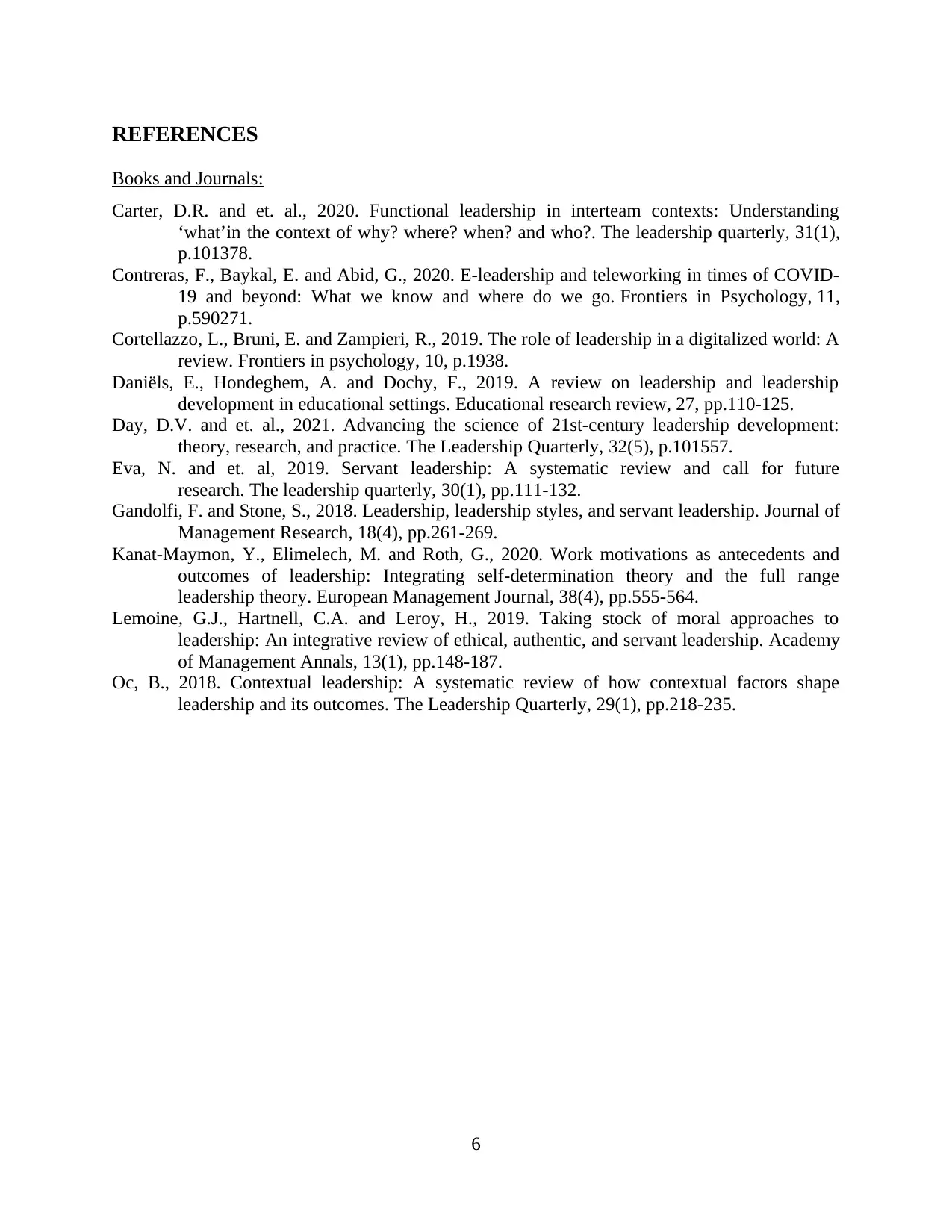
REFERENCES
Books and Journals:
Carter, D.R. and et. al., 2020. Functional leadership in interteam contexts: Understanding
‘what’in the context of why? where? when? and who?. The leadership quarterly, 31(1),
p.101378.
Contreras, F., Baykal, E. and Abid, G., 2020. E-leadership and teleworking in times of COVID-
19 and beyond: What we know and where do we go. Frontiers in Psychology, 11,
p.590271.
Cortellazzo, L., Bruni, E. and Zampieri, R., 2019. The role of leadership in a digitalized world: A
review. Frontiers in psychology, 10, p.1938.
Daniëls, E., Hondeghem, A. and Dochy, F., 2019. A review on leadership and leadership
development in educational settings. Educational research review, 27, pp.110-125.
Day, D.V. and et. al., 2021. Advancing the science of 21st-century leadership development:
theory, research, and practice. The Leadership Quarterly, 32(5), p.101557.
Eva, N. and et. al, 2019. Servant leadership: A systematic review and call for future
research. The leadership quarterly, 30(1), pp.111-132.
Gandolfi, F. and Stone, S., 2018. Leadership, leadership styles, and servant leadership. Journal of
Management Research, 18(4), pp.261-269.
Kanat-Maymon, Y., Elimelech, M. and Roth, G., 2020. Work motivations as antecedents and
outcomes of leadership: Integrating self-determination theory and the full range
leadership theory. European Management Journal, 38(4), pp.555-564.
Lemoine, G.J., Hartnell, C.A. and Leroy, H., 2019. Taking stock of moral approaches to
leadership: An integrative review of ethical, authentic, and servant leadership. Academy
of Management Annals, 13(1), pp.148-187.
Oc, B., 2018. Contextual leadership: A systematic review of how contextual factors shape
leadership and its outcomes. The Leadership Quarterly, 29(1), pp.218-235.
6
Books and Journals:
Carter, D.R. and et. al., 2020. Functional leadership in interteam contexts: Understanding
‘what’in the context of why? where? when? and who?. The leadership quarterly, 31(1),
p.101378.
Contreras, F., Baykal, E. and Abid, G., 2020. E-leadership and teleworking in times of COVID-
19 and beyond: What we know and where do we go. Frontiers in Psychology, 11,
p.590271.
Cortellazzo, L., Bruni, E. and Zampieri, R., 2019. The role of leadership in a digitalized world: A
review. Frontiers in psychology, 10, p.1938.
Daniëls, E., Hondeghem, A. and Dochy, F., 2019. A review on leadership and leadership
development in educational settings. Educational research review, 27, pp.110-125.
Day, D.V. and et. al., 2021. Advancing the science of 21st-century leadership development:
theory, research, and practice. The Leadership Quarterly, 32(5), p.101557.
Eva, N. and et. al, 2019. Servant leadership: A systematic review and call for future
research. The leadership quarterly, 30(1), pp.111-132.
Gandolfi, F. and Stone, S., 2018. Leadership, leadership styles, and servant leadership. Journal of
Management Research, 18(4), pp.261-269.
Kanat-Maymon, Y., Elimelech, M. and Roth, G., 2020. Work motivations as antecedents and
outcomes of leadership: Integrating self-determination theory and the full range
leadership theory. European Management Journal, 38(4), pp.555-564.
Lemoine, G.J., Hartnell, C.A. and Leroy, H., 2019. Taking stock of moral approaches to
leadership: An integrative review of ethical, authentic, and servant leadership. Academy
of Management Annals, 13(1), pp.148-187.
Oc, B., 2018. Contextual leadership: A systematic review of how contextual factors shape
leadership and its outcomes. The Leadership Quarterly, 29(1), pp.218-235.
6
1 out of 8
Related Documents
Your All-in-One AI-Powered Toolkit for Academic Success.
+13062052269
info@desklib.com
Available 24*7 on WhatsApp / Email
![[object Object]](/_next/static/media/star-bottom.7253800d.svg)
Unlock your academic potential
Copyright © 2020–2025 A2Z Services. All Rights Reserved. Developed and managed by ZUCOL.




